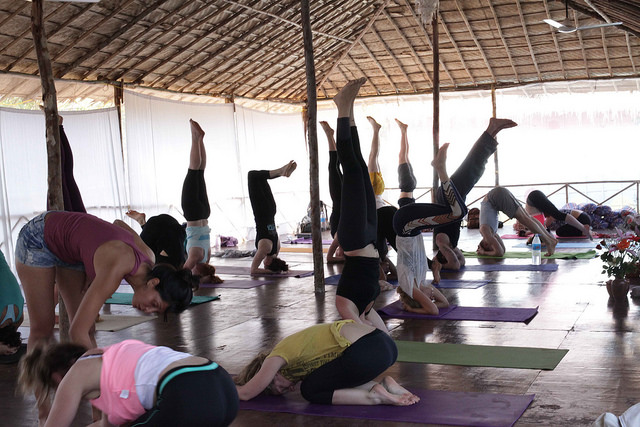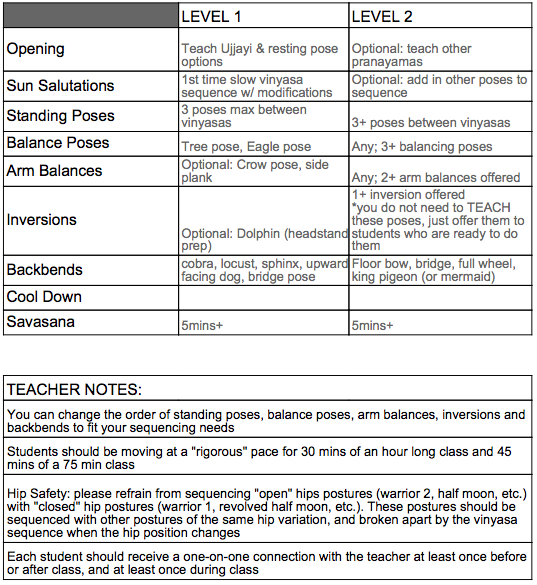Recently, I’ve been noticing the ways in which we are encouraged to respond with fear to different situations.
And when we respond with fear, the outcome is usually that we retract, put up barriers between ourselves and others, and conceal our truth as if exposing it would somehow harm us.
This plays out in all types of environments: corporate, social, political, religious, etc., where it seems we are encouraged to “keep our mouths shut,” because opening them would lead to lawsuits, competition, rivalry, and ultimately, our own defeat.
This has always rubbed me the wrong way. As the resident “non-secret holder” of any group I’ve been a part of, it feels very natural for me to expose my thoughts and feelings as a way of connecting with myself and others.
Before I opened a yoga studio with my partner a year-and-a-half ago, I was working at about nine different yoga studios, and was able to observe the variety of ways that studios are built, managed and run. However, when I opened up to my bosses about my plan to open my own studio, the tables seemed to turn.
Suddenly I was no longer allowed to know about studio operations or functioning, and was even let-go of my jobs at several places for contracts I never signed labeled “non-compete agreements” (a demand I was told I tacitly agreed to upon my hire).
This kind of blew my mind, because I assumed that the yoga culture was based in the understanding that competition is a made-up mental event and therefore does not actually exist. I then realized that I wasn’t dealing with yoga culture, I was dealing with business culture, which is a horse of a different color.
I thought maybe I would understand the value in shutting-up once I opened my own studio, but now as a yoga business owner, I doubly don’t see the point in concealing anything from anyone. There is, of course, an art to communication, where not every piece of information is relevant to every listener, but there is no such thing as being harmed by the truth, as long as that truth is actually true, and not based in judgment or expectation.
I bring this up because we are in the process (a never-ending process really) of building clientele and developing studio standards, which make it easier for us to attract the type of student who is most aligned with what we already offer, and to retain that student once they walk in the door.
Our most recent project has been to develop class standards, so that students can have realistic expectations for their classes and know that the yoga class they choose will meet those expectations. In developing these standards, we’ve been able to concretely specify the difference between Level 1 and Level 2 classes, and provide consistency between teachers without asking them to compromise on the creativity that makes their classes unique and alive.
As I’ve been writing and working with this living document, it dawned on me that these standards ought to be public, not just for the students of our studio, but also because the yoga community is voraciously interested in consuming as much juicy information as possible and therefore should be entitled to look this over if they so choose.
I receive nothing by concealing this information, but I receive internal freedom and wide-open space by sharing it.
Enjoy!
*We are currently working on our class standards for our (Hatha) Yoga classes, and relaxation/gentle based classes.
Fermata Yoga Class Standards for Flowing Yoga (Vinyasa):
Bonus: The schedule is by far the most challenging aspect for us to straighten out as business owners. We find ourselves constantly fine-tuning, re-examining, re-working, praising and criticizing it. For fellow yoga studio owners and managers, this video provides insight for how and why we make the business decisions we make when it comes to the yoga studio schedule, and can perhaps add insight if and when you run into your own schedule-stagnation:
~
Relephant:
5 Business Tips for Yoga Teachers.
~
Author: Brentan Schellenbach
Editor: Travis May
Photo: Flickr/The Yoga People


 Share on bsky
Share on bsky






Read 0 comments and reply